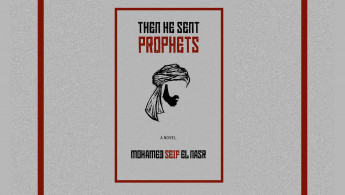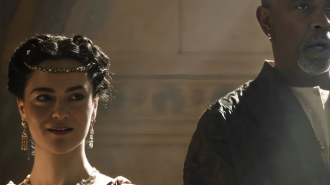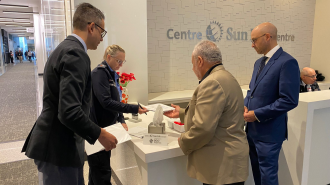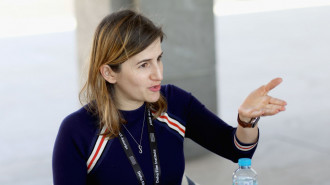The quest for the truth in Egyptian writer Mohamed Seif El Nasr’s novel Then He Sent Prophets
“I would rather die than live with a guilty conscience.” This might sound like an overly-idealistic statement, but it holds increasing relevance in today’s political climate.
In this case, it’s uttered by Zakaria – the main character in the upcoming novel, Then He Sent Prophets, by Egyptian writer Mohamed Seif El Nasr, to be published in October 2024 by Daraja Press.
For Zakaria, ethics and principles are beacons of light for living as a Muslim, and the difference between right and wrong is “as clear as black and white tiles.”
But he quickly realises that staying on the side of the light, while working under a corrupt government is a difficult balance to straddle.
Seif El Nasr studied history and political science at the American University in Cairo and travelled to Morocco and Spain over the eight years he spent working on Then He Sent Prophets.
Categorised as historical fiction, the story is set in 14th-century Fes, just after the Golden Age of Islam, during the Marinid Sultanate and Kingdom of Granada.
This time period was well-documented, and the works of two prominent intellectual figures – Ibn Khaldun and Ibn al-Khatib, who each served as official secretaries to the sultans in Fes and Granada – provided ample research material for Seif El Nasr.
“Government is an institution that prevents injustice other than such as it commits itself,” states Ibn Khaldun in Seif El Nasr’s novel, indicating the paradox at its core.
Feeling financially disgraced and demasculinised, circumstances present Zakaria with a position at the palace, which would require him to compromise his principles.
Can someone critical of the sultan and conscious of his corruption maintain integrity while serving at the palace? And what’s the line between complete innocence and partial complicity?
These are the questions at the crux of his ethical dilemma, as he accepts the position to better provide for his family.
“Zakaria’s character in the novel has a strong awareness of the injustices in his world,” Seif El Nasr tells The New Arab.
“He refuses to compromise by accepting or disregarding those injustices but struggles to change them."
Seif El Nasr continues, "I think this is relatable to readers today because we live at a time where people’s awareness – especially young people – of the injustices in the world has reached unprecedented levels, but we are also still at a point where we cannot find the means to change them, still struggling to find a path forward.”
While reading, it’s easy to make connections between Zakaria’s inner dilemmas and those many of us grapple with today.
If he works for the sultan, is he complicit in his crimes?
If we work for genocide-enabling governments or businesses that fund Israel, are we merely cogs in their systems?
Students across the Western world set up encampments earlier this year to show their solidarity with Palestine – and it’s this strong stance against injustice that is reflected in Zakaria too.
While his conscience may be commendable, it is Zakaria’s unorthodox approach to religion that makes the main character all the more compelling.
Expelled from madrasa as a child, he is in pursuit of true spiritual wisdom in a world where everyone else seems to accept the canonised faith without inquisition.
“A rigorous, superficial interpretation of Islam flourishes,” and emerging as a reformist of his time, Zakaria seeks to return to the Prophet Muhammad’s teachings – not the scholar’s interpretations of those teachings.
“I have known no one whose legacy has been desecrated more than our prophet,” writes Zakaria.
He – and his grandmother Tamima – question many alleged Prophetic Hadith, as well as widely accepted norms of the faith.
Seif El Nasr introduces readers to Tamima while she is praying – though, with her hair uncovered.
“Would the God who created me care about an old head full of white hair? The preachers these days have corrupted your minds with their nonsense,” she states brazenly.
And when she is told that a Prophetic saying claims that pious men will be rewarded with two virgins each in Paradise while wives will be allotted to the last man they married, she discounts this too as “nonsense” and says she’ll get whatever she wants in heaven.
The topic of women’s equality is further broached later when another Hadith about all women lacking in mind and religion is challenged by a character named Aisha.
“I find it impossible to believe that the Prophet, who ran trembling to his wife Khadija for counsel after he had first received the Revelation, could have said that,” she says.
Islamic scholars claim that the Hadith “complete” Islam, pointing to the fact that the rituals of the obligatory prayer are prescribed in the Hadith, rather than the Quran.
“But have the scholars ever considered that this was perhaps on purpose?” questions Zakaria. “Have they ever thought that our way of praying and reaching out to Allah is not the only way – but a way?”
He explores these questions in a book he is writing, about how the true spirit of Islam has been lost. Easily construed as borderline-heretical, his words “terrify” his mentor, and Zakaria finds his life in danger when the manuscript falls into the wrong hands.
Seif El Nasr began brainstorming for this novel in 2009 and he was heavily inspired by the rise in political Islam in the wake of the Arab Spring.
“I saw firsthand how religion was being used to manipulate the people here in Egypt, and had the idea to write about a religious scholar with progressive, but also contemporary views,” he explains.
During the 14th-century reign of the Marinid Dynasty, intellectualism was declining, and an orthodox form of Islam was rising in dominance – a reality that wasn’t all that unimaginable for the author.
“It was a period of political repression and economic deprivation in the Maghreb, allowing me to draw parallels to the current affairs of several Arab states,” he says.
“You get the feeling that nothing has changed—that we’ve been static for a thousand years.”
The very first scene of the book, which opens with a religious sermon at the mosque, illustrates how politics and religion are inextricably intertwined when the preacher emphasises that rulers should not be challenged.
This same preacher later chides a beggar for calling a Jewish doctor, “a good Muslim,” causing Zakaria to reflect on what it means to be a “Muslim” – whether it comes down to adherence to rituals or a pure heart.
In Zakaria, Seif El Nasr successfully crafts a complex protagonist who is both admirable and relatable. And yet he too isn’t perfect, as he underappreciates his wife and finds his lofty morality stretched when tempted by another woman.
The pace of the novel is a good balance between scenes in the present, filled with detail and dialogue, and sections that work to speed up the time that passes in between.
The real gems of the novel, however, are the thoughtful and reflective letters that Zakaria pens about faith and philosophy, placing his precious words in an ivory casket.
In one, he writes, “It is enough to say that by relying on the Prophet’s tradition, the scholars have condemned us to a sea of uncertainty and created a new religion with its new prophets.”
Readers of Leila Aboulela’s River Spirit might liken Zakaria to her protagonist, Yaseen, an Islamic jurist who sticks to his intuition rather than getting swept up in the zeal of the Mahdist Wars of Sudan.
Politics is no playground for the morally conscious, and yet Zakaria, carrying the weight of the world on his shoulders, is determined to make it work.
The plot climaxes towards the end of the novel in a battle scene, and the ending is tremendously powerful – easily envisioned on screen, if this novel were to be optioned for film – or better yet, television, combining a dramatic backdrop akin to hit series Ertuğrul, with a touch of cerebral stimulation that many Muslims could benefit from today.
Hafsa Lodi is an American-Muslim journalist who has been covering fashion and culture in the Middle East for more than a decade. Her work has appeared in The Independent, Refinery29, Business Insider, Teen Vogue, Vogue Arabia, The National, Luxury, Mojeh, Grazia Middle East, GQ Middle East, gal-dem and more. Hafsa’s debut non-fiction book Modesty: A Fashion Paradox, was launched at the 2020 Emirates Airline Festival of Literature
Follow her on Twitter: @HafsaLodi








 Follow the Middle East's top stories in English at The New Arab on Google News
Follow the Middle East's top stories in English at The New Arab on Google News


